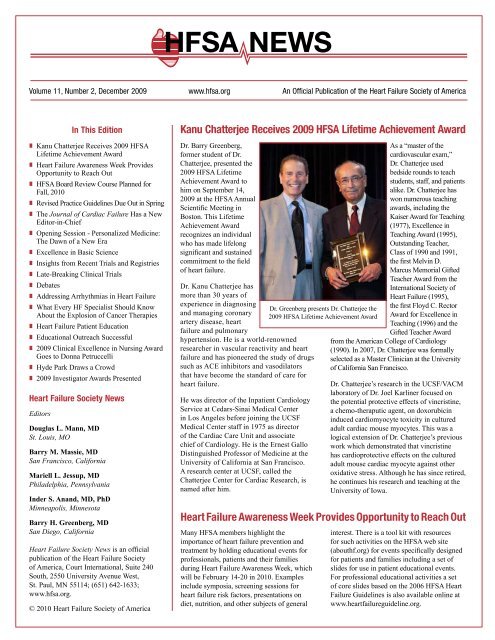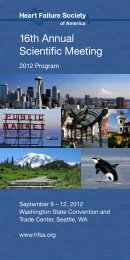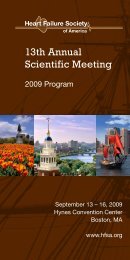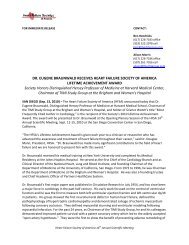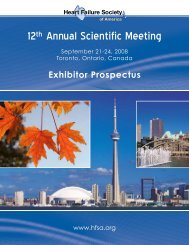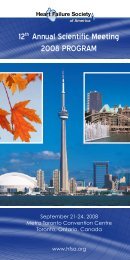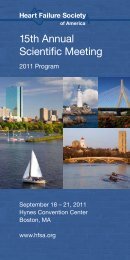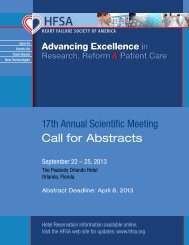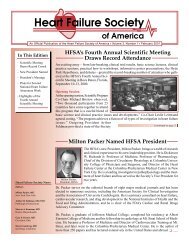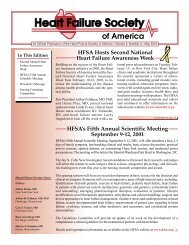Kanu Chatterjee Receives 2009 HFSA Lifetime Achievement Award ...
Kanu Chatterjee Receives 2009 HFSA Lifetime Achievement Award ...
Kanu Chatterjee Receives 2009 HFSA Lifetime Achievement Award ...
You also want an ePaper? Increase the reach of your titles
YUMPU automatically turns print PDFs into web optimized ePapers that Google loves.
Volume 11, Number 2, December <strong>2009</strong> www.hfsa.org An Official Publication of the Heart Failure Society of America<br />
Heart Failure Society News<br />
Editors<br />
In This Edition<br />
• <strong>Kanu</strong> <strong>Chatterjee</strong> <strong>Receives</strong> <strong>2009</strong> <strong>HFSA</strong><br />
<strong>Lifetime</strong> <strong>Achievement</strong> <strong>Award</strong><br />
• Heart Failure Awareness Week Provides<br />
Opportunity to Reach Out<br />
• <strong>HFSA</strong> Board Review Course Planned for<br />
Fall, 2010<br />
• Revised Practice Guidelines Due Out in Spring<br />
• The Journal of Cardiac Failure Has a New<br />
Editor-in-Chief<br />
• Opening Session - Personalized Medicine:<br />
The Dawn of a New Era<br />
• Excellence in Basic Science<br />
• Insights from Recent Trials and Registries<br />
• Late-Breaking Clinical Trials<br />
• Debates<br />
• Addressing Arrhythmias in Heart Failure<br />
• What Every HF Specialist Should Know<br />
About the Explosion of Cancer Therapies<br />
• Heart Failure Patient Education<br />
• Educational Outreach Successful<br />
• <strong>2009</strong> Clinical Excellence in Nursing <strong>Award</strong><br />
Goes to Donna Petruccelli<br />
• Hyde Park Draws a Crowd<br />
• <strong>2009</strong> Investigator <strong>Award</strong>s Presented<br />
Douglas L. Mann, MD<br />
St. Louis, MO<br />
Barry M. Massie, MD<br />
San Francisco, California<br />
Mariell L. Jessup, MD<br />
Philadelphia, Pennsylvania<br />
Inder S. Anand, MD, PhD<br />
Minneapolis, Minnesota<br />
Barry H. Greenberg, MD<br />
San Diego, California<br />
Heart Failure Society News is an official<br />
publication of the Heart Failure Society<br />
of America, Court International, Suite 240<br />
South, 2550 University Avenue West,<br />
St. Paul, MN 55114; (651) 642-1633;<br />
www.hfsa.org.<br />
© 2010 Heart Failure Society of America<br />
<strong>Kanu</strong> <strong>Chatterjee</strong> <strong>Receives</strong> <strong>2009</strong> <strong>HFSA</strong> <strong>Lifetime</strong> <strong>Achievement</strong> <strong>Award</strong><br />
Dr. Barry Greenberg,<br />
former student of Dr.<br />
<strong>Chatterjee</strong>, presented the<br />
<strong>2009</strong> <strong>HFSA</strong> <strong>Lifetime</strong><br />
<strong>Achievement</strong> <strong>Award</strong> to<br />
him on September 14,<br />
<strong>2009</strong> at the <strong>HFSA</strong> Annual<br />
Scientific Meeting in<br />
Boston. This <strong>Lifetime</strong><br />
<strong>Achievement</strong> <strong>Award</strong><br />
recognizes an individual<br />
who has made lifelong<br />
significant and sustained<br />
commitment to the field<br />
of heart failure.<br />
Dr. <strong>Kanu</strong> <strong>Chatterjee</strong> has<br />
more than 30 years of<br />
experience in diagnosing<br />
and managing coronary<br />
artery disease, heart<br />
failure and pulmonary<br />
hypertension. He is a world-renowned<br />
researcher in vascular reactivity and heart<br />
failure and has pioneered the study of drugs<br />
such as ACE inhibitors and vasodilators<br />
that have become the standard of care for<br />
heart failure.<br />
He was director of the Inpatient Cardiology<br />
Service at Cedars-Sinai Medical Center<br />
in Los Angeles before joining the UCSF<br />
Medical Center staff in 1975 as director<br />
of the Cardiac Care Unit and associate<br />
chief of Cardiology. He is the Ernest Gallo<br />
Distinguished Professor of Medicine at the<br />
University of California at San Francisco.<br />
A research center at UCSF, called the<br />
<strong>Chatterjee</strong> Center for Cardiac Research, is<br />
named after him.<br />
As a “master of the<br />
cardiovascular exam,”<br />
Dr. <strong>Chatterjee</strong> used<br />
bedside rounds to teach<br />
students, staff, and patients<br />
alike. Dr. <strong>Chatterjee</strong> has<br />
won numerous teaching<br />
awards, including the<br />
Kaiser <strong>Award</strong> for Teaching<br />
(1977), Excellence in<br />
Teaching <strong>Award</strong> (1995),<br />
Outstanding Teacher,<br />
Class of 1990 and 1991,<br />
the first Melvin D.<br />
Marcus Memorial Gifted<br />
Teacher <strong>Award</strong> from the<br />
International Society of<br />
Heart Failure (1995),<br />
the first Floyd C. Rector<br />
<strong>Award</strong> for Excellence in<br />
Teaching (1996) and the<br />
Gifted Teacher <strong>Award</strong><br />
from the American College of Cardiology<br />
(1990). In 2007, Dr. <strong>Chatterjee</strong> was formally<br />
selected as a Master Clinician at the University<br />
of California San Francisco.<br />
Dr. <strong>Chatterjee</strong>’s research in the UCSF/VACM<br />
laboratory of Dr. Joel Karliner focused on<br />
the potential protective effects of vincristine,<br />
a chemo-theraputic agent, on doxorubicin<br />
induced cardiomyocyte toxicity in cultured<br />
adult cardiac mouse myocytes. This was a<br />
logical extension of Dr. <strong>Chatterjee</strong>’s previous<br />
work which demonstrated that vincristine<br />
has cardioprotective effects on the cultured<br />
adult mouse cardiac myocyte against other<br />
oxidative stress. Although he has since retired,<br />
he continues his research and teaching at the<br />
University of Iowa.<br />
Heart Failure Awareness Week Provides Opportunity to Reach Out<br />
Many <strong>HFSA</strong> members highlight the<br />
importance of heart failure prevention and<br />
treatment by holding educational events for<br />
professionals, patients and their families<br />
during Heart Failure Awareness Week, which<br />
will be February 14-20 in 2010. Examples<br />
include symposia, screening sessions for<br />
heart failure risk factors, presentations on<br />
diet, nutrition, and other subjects of general<br />
Dr. Greenberg presents Dr. <strong>Chatterjee</strong> the<br />
<strong>2009</strong> <strong>HFSA</strong> <strong>Lifetime</strong> <strong>Achievement</strong> <strong>Award</strong><br />
interest. There is a tool kit with resources<br />
for such activities on the <strong>HFSA</strong> web site<br />
(abouthf.org) for events specifically designed<br />
for patients and families including a set of<br />
slides for use in patient educational events.<br />
For professional educational activities a set<br />
of core slides based on the 2006 <strong>HFSA</strong> Heart<br />
Failure Guidelines is also available online at<br />
www.heartfailureguideline.org.
Heart Failure Society News December <strong>2009</strong><br />
<strong>HFSA</strong> CME Board Review Course Planned for Fall, 2010<br />
A Board Review Course is being planned<br />
by the <strong>HFSA</strong> for October 1-3, 2010 in<br />
Minneapolis, MN. This review course is aimed<br />
at individuals planning to take the ABIM<br />
certificate exam in Advanced Heart Failure and<br />
Transplant Cardiology.<br />
This 2.5 day CME review course will be<br />
designed to meet the learning needs of those<br />
preparing to take the certifying exam. The<br />
course will provide an extensive summary of<br />
all aspects of heart failure including:<br />
• Epidemiology and causes of heart failure<br />
• Pathophysiology of heart failure<br />
• Evaluation of heart failure<br />
• Management of hospitalized patients<br />
• Management of heart failure<br />
• Comorbidities or coexisting conditions<br />
• Cardiac surgery in heart failure<br />
• Heart transplantation<br />
• Mechanical circulatory support<br />
• Pulmonary arterial hypertension<br />
Lectures will offer insight on how to think<br />
through Board questions and prepare for<br />
the exam. The curriculum will also provide<br />
a comprehensive and in-depth review for<br />
attendees not planning to take the Board exam.<br />
The program will include a combination of<br />
didactic lectures and case based presentations<br />
with emphasis on guidelines, knowledge<br />
and practice management multiple choice<br />
questions. All presentations will include<br />
questions designed in the manner of Board<br />
questions. An audience response system<br />
(ARS) will be used to compare your answers<br />
with your peers and faculty experts.<br />
The course, chaired by Barry Greenberg, is<br />
being developed with the help of three core<br />
directors John Chin, G. Michael Felker, and<br />
James Fang, and the following core leaders:<br />
Javed Butler, Wilson Colucci, John DiMarco,<br />
Marvin Konstam, and Margaret Redfield.<br />
They will be joined by other invited speakers.<br />
Information regarding cost, hotel information<br />
and registration is posted on the <strong>HFSA</strong><br />
website. To view FAQs and learn more,<br />
please visit www.hfsa.org.<br />
Additional information about the certifying<br />
exam can be found on the American Board of<br />
Internal Medicine (ABIM) website at www.<br />
abim.org/specialty/ahftc.aspx. The date of<br />
the first certifying exam is November 8, 2010.<br />
Revised Practice Guidelines<br />
Due Out in Spring<br />
Attendees at the Annual Scientific Meeting got<br />
a sneak peek at some of the changes proposed<br />
for the 2010 updated <strong>HFSA</strong> practice guidelines<br />
at a session chaired by JoAnn Lindenfeld<br />
(Denver, CO) and Carla S. Dupree (Chapel<br />
Hill, NC). Randall C. Starling (Cleveland,<br />
OH) and John P. Boehmer (Hershey, PA)<br />
discussed changes in recommendations for<br />
the use of implantable devices in heart failure,<br />
including prophylactic ICD placement, the<br />
use of biventricular pacing, and the concept of<br />
“bridge to decision” in mechanical circulatory<br />
support. Changes in recommendations on<br />
disease management and non-pharmacologic<br />
management of heart failure were discussed by<br />
Nancy M. Albert (Cleveland, OH) and Mary<br />
N. Walsh (Indianapolis, IN). Areas addressed<br />
included the obesity paradox, defibrillator<br />
inactivation, and exercise. The difficult area<br />
of acute decompensated heart failure, a major<br />
section in the practice guidelines, was reviewed<br />
by Michael M. Givertz (Boston, MA) and Paul<br />
J. Mather (Philadelphia, PA).<br />
2010 update of the <strong>HFSA</strong> Comprehensive<br />
Heart Failure Practice Guideline has been led<br />
by JoAnn Lindenfeld, Chair of the Guideline<br />
Committee (2003-<strong>2009</strong>). Current guideline<br />
committee members as well as some from<br />
the previous guideline committee have<br />
all contributed to this process and will be<br />
recognized when the updated guideline is<br />
published.<br />
Dr. Mann congratulating Dr. Massie<br />
The Journal has come a long way since Barry<br />
Massie assumed the role of Editor-in-Chief<br />
in 2002. At that time the journal was being<br />
published bi-monthly. It is now published<br />
monthly. This plus a current impact factor of<br />
3.691, first among journals on heart failure,<br />
are some the legacies that Dr. Massie will<br />
leave the new editor-in-chief, Gary S. Francis<br />
(Minneapolis, MN), who assumed the role of<br />
Editor-in-Chief January 2010.<br />
The Journal of Cardiac Failure Has a New Editor-in-Chief<br />
The mission of JCF is to bring to the national<br />
and international scientific community new<br />
information on all facets of heart dysfunction<br />
and failure. It publishes peer-reviewed<br />
manuscripts of interest to clinicians and<br />
researchers in the field of heart failure and<br />
related disciplines. It is a valuable resource<br />
for information on the latest developments<br />
in patient care management of heart failure.<br />
The Publications Committee of the <strong>HFSA</strong><br />
has encouraged the new Editor-in-Chief to be<br />
creative to distinguish this Journal from others,<br />
while maintaining its scientific excellence.<br />
About the new Editor-in-Chief: Gary S.<br />
Francis, MD is Professor of Medicine at the<br />
University of Minnesota. Prior to that he was<br />
Head of Clinical Cardiology Section at the<br />
Cleveland Clinic; Professor of Medicine at the<br />
Cleveland Clinic Lerner College of Medicine<br />
at Case Western Reserve University; and had<br />
an appointment in the Kaufman Center for<br />
Heart Failure and the Transplant Center at<br />
the Clinic. He received his undergraduate and<br />
MD at the University of Minnesota and did<br />
advanced training in Chicago and San Diego.<br />
Before moving to Cleveland, Dr. Francis<br />
was Professor of Medicine at the University<br />
of Minnesota and Research Director of the<br />
Rasmussen Center for Heart Failure. He<br />
is board certified in Internal Medicine and<br />
Cardiovascular Diseases. Dr. Francis’s main<br />
interests are heart failure and acute coronary<br />
syndromes. He served as President of the<br />
Heart Failure Society of America (<strong>HFSA</strong>)<br />
2004-2006. He is a Fellow of the American<br />
College of Cardiology, American College<br />
of Physicians and the American Heart<br />
Association.<br />
Dr. Francis has had a leadership role in many<br />
clinical trials at the national and international<br />
level, and has served on the Data and Safety<br />
Monitoring Boards of 20 large international<br />
trials. He has authored or co-authored more<br />
than 600 original manuscripts, review papers,<br />
editorials, and book chapters and has edited or<br />
co-edited 17 books.<br />
2
Heart Failure Society News December <strong>2009</strong><br />
Highlights from the 13th Annual Scientific Meeting<br />
Opening Session – Personalized Medicine: The Dawn of a New Era<br />
The Opening Plenary session presented<br />
three different perspectives on the<br />
application of genetic information and<br />
testing to better understand complex<br />
human disease and personalize<br />
medicine. David A. Schwartz (Denver,<br />
CO), an expert on pulmonary disease,<br />
addressed the role of the epigenome<br />
in the development of disease. One<br />
important aspect of personalized<br />
medicine is how the environment is<br />
altering biology and therefore affecting<br />
the risk of developing disease. Schwartz<br />
explained that the field of epigenetics<br />
concerns the mechanisms that control<br />
gene regulation and transcription. These<br />
epigenetic mechanisms can be altered by the<br />
environment or inherited from one generation<br />
to the next. The goal is to measure these<br />
epigenetic marks in patients and use them<br />
to identify individuals who may respond to<br />
certain medications.<br />
Atul J. Butte (Palo Alto, CA) discussed<br />
translational bioinformatics. There are now<br />
approximately 350,000 publicly available<br />
microarrays, a number that should double or<br />
triple each year. This easily-searched data is<br />
leading to a new taxonomy of disease based<br />
on genomics.<br />
David E. Duncan, a journalist, (Berkley,<br />
CA) anchored the session by recounting<br />
his experiences in the “Experimental<br />
Man” project in a talk, “One Man’s Quest<br />
for Personalized Medicine.” The project<br />
involved taking 320 tests, including<br />
genetic and gene expression tests that<br />
required having 2 liters of blood drawn<br />
and undergoing 22 hours of MRI scans.<br />
Baseline testing showed that Duncan was<br />
a healthy 51-year-old male. However,<br />
a battery of genetic tests indicated that<br />
Duncan was at a lifetime risk for several<br />
illnesses or events, including myocardial<br />
infarction and addiction. He learned<br />
he had a greater tolerance for caffeine,<br />
had a greater propensity for risk taking, and<br />
showed a high exposure to DDT. Duncan<br />
said his experiences underscored the need<br />
to standardize and organize the information<br />
better, since different companies showed<br />
different results.<br />
Oliver Smithies, PhD receiving 3rd Distinguished<br />
Lecture in Basic Science<br />
Excellence in Basic Science<br />
Oliver Smithies, PhD, co-recipient of the<br />
2007 Nobel Prize in Physiology or Medicine<br />
for work on gene modifications in mice<br />
through the use of embryonic stem cells,<br />
delivered the 3rd Distinguished Lecture in<br />
Basic Science. Following Smithies’ lecture<br />
were presentations on the current role of<br />
mouse models in cardiovascular research,<br />
current research in cardiac transgenesis, and<br />
the implications of biased signaling by G<br />
protein-coupled receptors for the treatment<br />
of patients with heart failure. The Special<br />
Sunday Session is the kick off for the basic<br />
science component of the annual meeting, and<br />
always features excellent speakers that attract<br />
a large audience.<br />
Insights from Recent Trials and Registries<br />
Key data and new insights from 4 recent<br />
trials and registries of heart failure therapies<br />
were discussed in a session focusing on<br />
implications for patient care. James K.<br />
Kirklin (Birmingham, AL) presented on the<br />
INTERMACS registry; David J. Whellan<br />
(Philadelphia, PA) presented HF-ACTION;<br />
Peter E. Carson (Washington, DC) discussed<br />
the I-PRESERVE trial; and Eric J. Velazquez<br />
(Durham, NC) presented the STICH trial.<br />
INTERMACS is a U.S. national registry for<br />
patients receiving mechanical circulatory<br />
support therapy for advanced heart failure.<br />
Registry data indicates that the strategy is<br />
increasingly to implant a temporary device<br />
before the patient is in cardiogenic shock<br />
and to do it as an elective procedure. Patients<br />
with an isolated LVAD have the best survival.<br />
However, there are still issues with long-term<br />
survival, and destination therapy currently does<br />
not look favorable. There is a clear movement<br />
from pulsatile to axial flow pumps.<br />
Most patients enrolled in ACTION-HF did not<br />
meet the exercise goal, but approximately 30%<br />
achieved or surpassed the target. When the<br />
results were adjusted for baseline prognostic<br />
factors such as EF, atrial fibrillation, and<br />
depression, there was a significant benefit, with<br />
greater exercise resulting in a greater benefit<br />
in terms of the primary end point. The study<br />
clearly demonstrated that exercise training for<br />
heart failure patients is safe.<br />
Approximately 50% of patients with heart<br />
failure have an ejection fraction of at least<br />
45%, but no pharmacological therapies have<br />
been shown to improve outcomes. Irbesartan<br />
did not improve outcomes in patients in<br />
the I-PRESERVE trial. Although mortality<br />
in the study was substantial, the change in<br />
Minnesota Living with Heart Failure scores<br />
was favorable.<br />
One of the objectives of the STICH trial was<br />
to compare surgical ventricular reconstruction<br />
(SVR) in addition to a coronary artery<br />
bypass graft (CABG) procedure to CABG<br />
alone. Results of the randomized study of<br />
1,000 patients found no differences between<br />
the 2 groups in death or cardiovascular<br />
hospitalization.<br />
3
Heart Failure Society News December <strong>2009</strong><br />
Eight late-breaking clinical trials were presented in 2 sessions at the<br />
<strong>2009</strong> Annual Scientific Meeting. Additional information about the trials<br />
has been published in J Card Fail, <strong>2009</strong>;15:813-816.<br />
Superior Performance of Intrathoracic Impedance Derived Fluid<br />
Index versus Daily Weight Monitoring in Heart Failure Patients:<br />
Results of the Fluid Accumulation Status Trial (FAST)<br />
William T. Abraham (Columbus, OH) presented the results of the FAST<br />
study, which compared intrathroacic fluid monitoring by an implantable<br />
cardiac resynchronization and implantable cardioverter defibrillator<br />
device with daily weight monitoring as predictors of worsening<br />
heart failure. The study found that of 65 adjudicated heart failure<br />
events, 40 events (62%) were detected by intrathoracic impedance<br />
monitoring, but not by daily weight monitoring. Five events (8%) were<br />
detected by weight but not by intrathoracic impedance monitoring. In<br />
conclusion, fluid monitoring is a more accurate predictor of worsening<br />
heart compared to daily weight monitoring, partially because patient<br />
compliance to daily weight monitoring is poor (76%).<br />
Improving Evidence-Based Care for Heart Failure in Outpatient<br />
Cardiology Practices: Primary Results of IMPROVE HF<br />
Clyde W. Yancy (Dallas, TX) presented the results of the IMPROVE<br />
HF, an open registry and prospective study that is a comprehensive<br />
effort to address performance improvement for heart failure in the<br />
outpatient setting. Quality of care in IMPROVE HF was assessed using<br />
7 criteria: the use of ACE inhibitor/ARBs; beta-blockers; aldosterone<br />
antagonists; anticoagulation for atrial fibrillation (AF); CRT-P/CRT-D;<br />
ICD/CRT-D; and heart failure education. Practice-specific education<br />
and implementation tools were used to promote adherence to the<br />
quality measures. The study found that the heart failure performance<br />
improvement intervention resulted in significant improvements in all<br />
quality measures, except anticoagulation for AF.<br />
Reduction in the Risk of Heart Failure with Preventive Cardiac<br />
Resynchronization Therapy: MADIT-CRT<br />
Arthur J. Moss (Rochester, NY) presented the results of the MADIT-<br />
CRT trial, which studied the use of CRT-D devices in minimally<br />
symptomatic cardiac patients. The study met the primary endpoint<br />
with a 34% reduction in mortality or a heart failure event in patients<br />
receiving a CRT-D device. The benefit of CRT-D was driven by a 41%<br />
reduction in the heart failure event rate. There was no difference in the<br />
mortality rate between the two treatment groups.<br />
14th Annual Scientific Meeting<br />
September 12 – 15, 2010<br />
San Diego Convention Center, San Diego, CA<br />
www.hfsa.org<br />
Late-Breaking Clinical Trials<br />
Effects of Rolofylline, A Selective Adenosine A1 Antagonist in<br />
Patients Hospitalized for ADHF and Renal Impairment: Findings<br />
from the PROTECT Study<br />
Christopher M. O’Connor (Durham, NC) presented findings from the<br />
PROTECT study, which studied the potential benefits of rolofylline,<br />
a selective adenosine A1-receptor antagonist, in reducing renal<br />
impairment, worsening heart failure symptoms, and readmission for<br />
heart failure or death. The study did not meet the primary endpoint. The<br />
overall safety profiles of placebo and rolofylline were similar. However,<br />
treatment with rolofylline 30 mg was associated with a higher incidence<br />
of seizures and a trend toward more strokes.<br />
Clinical and Prognostic Value of Galectin-3: A Novel Fibrosis-<br />
Associated Biomarker in Patients with Chronic Heart Failure<br />
Dirk Jan van Veldhuisen (Groningen, Netherlands) presented on the<br />
prognostic value of galectin-3 in acute heart failure. The Coordinating<br />
Study Evaluating Outcomes of Advising and Counseling in Heart<br />
Failure (COACH) found that galectin-3 is an independent, powerful<br />
prognostic marker in patients with heart failure. Further studies will be<br />
needed to examine how galectin-3 can be decreased and whether this<br />
may affect outcomes.<br />
Relationship of Resting Myocardial Perfusion to Death and<br />
Hospitalization in Heart Failure Patients: Results from the Nuclear<br />
Sub-Study of HF-ACTION Trial<br />
Salvador Borges-Neto (Durham, NC) presented the results of a substudy<br />
of the HF-ACTION trial that used nuclear imaging to provide<br />
diagnostic and prognostic information on heart failure. The study<br />
found an inverse relationship between the degree and severity of<br />
resting perfusion abnormalities with mortality and cardiovascular<br />
hospitalizations. The degree and severity of resting perfusion<br />
abnormalities can reliably distinguish between ischemic and nonischemic<br />
etiologies of heart failure. Rest gated SPECT derived<br />
perfusion and functional variables provide significant prognostic<br />
information above and beyond the clinical characteristics of patients<br />
in the HF-ACTION trial.<br />
Renoprotective and Potassium Sparing Effects of Low Dose<br />
Dopamine in ADHF<br />
Filippos Triposkiadis (Larissa, Greece) presented the results of<br />
a study which investigated the benefits of combining furosemide<br />
with dopamine in terms of renal function in acute decompensated<br />
heart failure. Results of the study found urine output and dyspnea<br />
relief were similar in treatment and placebo groups. There was<br />
a lower incidence of worsening renal function and of electrolyte<br />
abnormalities in the patients receiving low dose furosemide and<br />
dopamine. There was no difference in long-term clinical outcomes<br />
in both groups.<br />
MARVEL-1: A Double-Blind, Randomized, Controlled, Multicenter<br />
Study to Assess The Safety And Cardiovascular Effects of Myocell<br />
Implantation by a Catheter Delivery System in Congestive Heart<br />
Failure Patients Post Myocardial Infarction(s)<br />
Dr. Thomas Povsic presented the results of the MARVEL-1 trial.<br />
It was the first double-blind placebo controlled study to assess<br />
intramyocardial myoblast administration using a percutaneous<br />
approach in patients with advanced ventricular dysfunction. A<br />
relatively high arrhythmic event rate was observed, but was short lived<br />
and responded to amiodarone therapy. Clinical meaningful trends<br />
in improvements in 6-MWT compared with placebo administration<br />
were observed. Given the limited treatment options in these patients,<br />
myoblast therapy warrants continued evaluation. These results will<br />
impact the design of future studies in this field.<br />
4
Heart Failure Society News December <strong>2009</strong><br />
Pivotal Clinical Trials Should only be<br />
done in North America<br />
In the first debate Robert M. Califf (Durham,<br />
NC) and Karl Swedberg (Göteborg, Sweden)<br />
presented arguments for and against doing<br />
clinical trials only in North America. Dr.<br />
Califf reframed the question to the broader<br />
one of whether clinical trials “should<br />
include adequate numbers of U.S. patients.”<br />
He noted that a review of outcomes in<br />
cardiovascular drug trials over the last 10<br />
years found that in 13 of the 15 trials the<br />
results in the U.S. varied significantly from<br />
those in the rest of the world. The question is<br />
how we handle regional differences.<br />
Dr. Swedberg questioned the existence of<br />
regional variations. Major trials of ACEinhibitors<br />
post-MI performed in several<br />
European countries and in North America<br />
and primary prevention statin trials done in<br />
Europe and North America show consistent<br />
results. In general, trials done properly<br />
will show similar benefits across regions.<br />
Pivotal trials should include a broad patient<br />
population.<br />
2010 <strong>HFSA</strong> RESEARCH<br />
FELLOWSHIPS<br />
The purpose of the research fellowship<br />
is to develop clinician-investigators in<br />
the field of heart failure.<br />
APPLICATIONS AVAILABLE ON-LINE<br />
2010 Research Fellowship Application<br />
Receipt Deadline:<br />
Monday, February 1, 2010<br />
Debates<br />
Clinical Trials Should be Conducted in<br />
Targeted Populations<br />
In the second debate, Clyde W. Yancy (Dallas,<br />
TX) and Milton Packer (Dallas, TX) debated<br />
the question of whether clinical trials should be<br />
conducted in targeted populations. Dr. Yancy<br />
argued that in the case of certain groups and<br />
certain disease states, heart failure being one,<br />
the differences between groups must be taken<br />
into account. National health statistics illustrate<br />
differences in the cardiovascular disease<br />
burden according to age, gender, and race. He<br />
also noted that randomized controlled trials<br />
do not include a representative sample of the<br />
U.S. population. How can we accept the results<br />
of trials targeting high-risk hypertensives<br />
with a low percentage of African Americans<br />
participating, when it is clear that African<br />
Americans are at higher risk of developing<br />
hypertension?<br />
Dr. Packer argued that sub-group analyses<br />
are not reliable. V-HeFT reduced mortality<br />
in all patients. Some researchers thought<br />
race merited a closer look and initiated<br />
the A-HeFT trial to confirm the sub-group<br />
analysis. When data from both trials<br />
are considered, it appears that the drug<br />
combination works even better in white<br />
patients than in African Americans. Dr. Packer<br />
concluded that a stratified approach including<br />
all populations should be used in designing a<br />
randomized clinical trial.<br />
<strong>HFSA</strong> CME Board Review Course<br />
for ABIM 2010 Certifying Exam:<br />
Advanced HF/Transplant Cardiology<br />
October 1-3, 2010<br />
Minneapolis Airport Marriott,<br />
Bloomington, MN<br />
Addressing Arrhythmias in Heart Failure<br />
The first speaker of the session was Sanjiv M.<br />
Narayan (San Diego, CA) who addressed the<br />
changing epidemiology of atrial fibrillation<br />
(AF) and sudden cardiac death (SCD) in<br />
relation to heart failure. AF complicates the<br />
treatment of heart failure, and the combination<br />
of both disorders is particularly detrimental,<br />
leading to substantially increased mortality.<br />
Obesity will be an increasingly important<br />
etiology for AF. Studies show falling trends in<br />
the stroke rate for patients with AF, consistent<br />
with the general decrease in stroke rates and the<br />
increased use of warfarin, but the treatment of<br />
patients with AF remains sub-optimal.<br />
William G. Stevenson (Boston, MA) focused<br />
the issue of medication efficacy in the treatment<br />
of AF in heart failure patients. Warfarin is the<br />
standard of care. The importance of rate control<br />
cannot be overemphasized. It normally takes a<br />
number of drugs to achieve that goal, with beta<br />
blockers commonly combined with digoxin.<br />
Recent studies have demonstrated no differences<br />
between rhythm control and rate control.<br />
Therefore, routine attempts to maintain sinus<br />
rhythm are not warranted. However, if a patient<br />
is symptomatic, and rate control is difficult, it is<br />
reasonable to consider a rhythm control strategy.<br />
Bruce L. Wilkoff (Cleveland, OH) addressed<br />
ICD therapy as long-term strategy. ICD<br />
therapy prolongs patients’ live an average of<br />
1.2 years over 8 years. ICD therapy can be<br />
improved by using AAI mode for ventricular<br />
backup pacing, because right ventricular<br />
pacing has been shown to increase mortality.<br />
Reducing shocks by using antitachycardia<br />
pacing and other discriminators is another<br />
way to improve ICD therapy.<br />
Vivek Y. Reddy (New York, NY) rounded<br />
out the session with a talk on the application<br />
of ablation for ventricular tachyarrhythmia<br />
(VT) in ICD patients. Clinical efficacy data<br />
for VT ablation are limited. Most studies are<br />
single-center. Based on the data available, the<br />
procedure appears quite safe and effective.<br />
We should consider whether ICD patients at<br />
high risk of shock should undergo VT ablation<br />
to reduce the incidence of shock and prevent<br />
ICD storms.<br />
5
Heart Failure Society News December <strong>2009</strong><br />
What Every Heart Failure<br />
Specialist Should Know<br />
About the Explosion of<br />
Cancer Therapies<br />
In this session, Thomas Force (Philadelphia,<br />
PA) addressed the use of kinase inhibitors<br />
in the treatment of cancer. Many cancers are<br />
driven by mutations in protein kinases. Kinase<br />
inhibitors work by preventing ATP binding in<br />
and disrupting downstream signaling pathways<br />
in kinases. They can also inhibit angiogenesis.<br />
However, kinases are also expressed in the heart,<br />
making cardiotoxicity unavoidable. The number<br />
of available kinase inhibitors is expected to<br />
increase substantially in the future. Drugs such<br />
as sunitinib can be effective in difficult-to-treat<br />
cancers; it’s a matter of balancing use with<br />
concomitant left ventricular toxicity.<br />
Daniel J Lenihan (Nashville, TN) spoke on<br />
the reversibility of heart failure induced by<br />
kinase inhibitors. Significant hypertension<br />
and decompensated heart failure have<br />
been reported in some studies of sunitinib..<br />
Extensive hypertensive remodeling will occur<br />
with a drug that destroys capillaries, said Dr.<br />
Lenihan. If cardiotoxicity is recognized early,<br />
it can be treated effectively with standard<br />
heart failure pharmacotherapy. But early<br />
detection can be challenging in a cancer<br />
patient, where symptoms such as fatigue can<br />
be confusing. Some work has suggested that<br />
the biomarkers troponin and BNP can be used<br />
to detect cardiotoxicity.<br />
Ming Hui Chen (Boston, MA) focused<br />
her remarks on cardiovascular disease in<br />
survivors of childhood cancer. Anthracyclines<br />
and radiation are commonly used to treat<br />
childhood cancers and are highly effective,<br />
but they have been shown to cause<br />
cardiotoxicity. The late cardiovascular effects<br />
of cancer therapy are progressive and may<br />
not be clinically present for decades. The<br />
risk increases with younger age at diagnosis,<br />
higher dose, and length of exposure. Women<br />
are at higher risk than men. Radiation therapy<br />
is also cardiotoxic, with the risk extending to<br />
every layer of the heart that is irradiated.<br />
The final speaker, Douglas B. Sawyer<br />
(Nashville, TN) addressed anthracycline<br />
cardiotoxicity and methods to decrease cardiac<br />
damage. Currently, the problem is being<br />
approached by infusing a lower concentration<br />
of the drug over a longer period of time.<br />
Another method is to administer a liposomal<br />
version of anthracycline, which appears to<br />
lower the drug’s cardiotoxicity. Other drugs<br />
that lower the cardiac uptake of anthracycline<br />
have been administered concomitantly.<br />
Terry A. Lennie (Lexington, KY) led off the<br />
session by outlining the challenges involved<br />
in educating patients about nutrition and<br />
strategies for improving compliance. Some<br />
patients might have limited access to the foods<br />
we recommend. They may not be available in<br />
grocery stores and restaurants frequented by<br />
patients, or people may not have transportation<br />
to go shopping regularly. Food storage and<br />
cooking possibilities may also be limited. Teach<br />
patients in the context of their environment to<br />
make nutritional recommendations relevant and<br />
improve compliance.<br />
Eileen Handberg (Gainesville, FL) presented<br />
information on motivating heart failure patients<br />
to be more active. Most heart failure patients do<br />
not engage in regular exercise. Take individual<br />
barriers into account and include the patient’s<br />
entire family in the planning process to help<br />
patients become more successful with an<br />
exercise prescription. Realize that lapses will<br />
occur and use them as a learning opportunity.<br />
J. Herbert Patterson (Chapel Hill, NC)<br />
discussed improving medication management<br />
in heart failure patients. Patients’ ability to take<br />
their medications correctly is dependent on<br />
In 2007, the Education Committee, chaired<br />
by Clyde W. Yancy (Dallas, TX), began a<br />
new initiative in the education of primary<br />
care physicians. The Primary Care Update,<br />
an annual one-day regional review course for<br />
primary care physicians and nurses, was phased<br />
out. To reach a wider audience the <strong>HFSA</strong> began<br />
an initiative to encourage national scientific<br />
meetings focusing on educating primary care<br />
physicians, to include a heart failure session as<br />
part of their annual meeting.<br />
Since that time, <strong>HFSA</strong> members have been<br />
invited as speakers as speakers for a heart<br />
failure session at the American Academy of<br />
Family Practice (AAFP) for the past three<br />
years, sometimes drawing more than 1,000<br />
attendees, and evaluations have been extremely<br />
positive. This year, in addition to the AAFP<br />
annual meeting, <strong>HFSA</strong> members participated<br />
Barbara Riegel presenting Nursing<br />
<strong>Award</strong> to Donna Petruccelli<br />
Heart Failure Patient Education<br />
their knowledge of the medications, cognitive<br />
ability, and health literacy. Health literacy is<br />
especially important, because research shows<br />
that health literacy and adherence are directly<br />
correlated. Adherence can be improved by<br />
tailoring education to specific drugs. For<br />
example, to improve adherence with beta<br />
blocker therapy, stress long-term benefits the<br />
importance of not stopping the drug.<br />
Educational Outreach Successful<br />
Paul Heidenreich (Los Angeles, CA)<br />
concluded the session with a discussion on<br />
healthcare quality measures and the question<br />
of compensation for adherence. There are<br />
various measures such as national rankings,<br />
performance measures, appropriateness<br />
measures, patient satisfaction surveys,<br />
and clinical outcomes, and mortality and<br />
hospitalization statistics. Patient care is<br />
constantly changing, so the appropriateness of<br />
measures must be re-evaluated. Reimbursement<br />
is another problem. Currently, there are<br />
disincentives for both hospitals and physicians<br />
to implement disease management programs.<br />
A pay-for-performance movement that<br />
compensates physicians for meeting quality<br />
care measures could improve patient care and<br />
resolve inequities.<br />
in a HF session at the American College of<br />
Physicians (ACP), and the American College<br />
of Clinical Pharmacy (ACCP). Clyde W. Yancy<br />
was the speaker at ACP, and at the <strong>2009</strong> AAFP<br />
meeting he was joined by David DeNofrio<br />
(Boston, MA) and Lynne Warner Stevenson<br />
(Boston, MA). J. Herbert Patterson (Durham,<br />
NC) was a primary organizer for the session<br />
at ACCP. Other speakers in the ACCP session<br />
included JoAnn Lindenfeld (Denver, CO), J.<br />
Thomas Heywood (Loma Linda, CA), and<br />
clinical pharmacists Sheryl L. Chow (Los<br />
Angeles, CA) and Mark A. Munger (Salt Lake<br />
City, UT).<br />
Proposals will be submitted to these<br />
organizations for their 2010 programs in<br />
addition to the American Academy of Nurse<br />
Practitioners (AANP). Other organizations are<br />
also under consideration.<br />
<strong>2009</strong> Clinical Excellence in Nursing <strong>Award</strong> Goes to Donna Petruccelli<br />
Donna Petruccelli, RN, MSN, CRNP was awarded the <strong>2009</strong><br />
<strong>HFSA</strong> Clinical Excellence in Nursing <strong>Award</strong> at the 13th<br />
<strong>HFSA</strong> Annual Scientific Meeting. Ms. Petruccelli is currently<br />
a Nurse Practitioner at the Center for Advanced Heart Failure<br />
at Lehigh Valley Hospital and Health Network, Allentown, PA<br />
where she has developed heart failure programs for hospital<br />
and hospital-based cardiology practice as well as pioneered<br />
hospital heart failure case management and participated in<br />
the development of a dedicated CHF Unit. Ms. Petruccelli<br />
received her BSN, MSN and CRNP from Temple University.<br />
She has participated in several research projects and published<br />
in the field of heart failure. This award is given annually to a<br />
nurse who is recognized for their excellence in heart failure<br />
clinical practice, special achievement in clinical practice or<br />
special contribution in the field of heart failure.<br />
6
Heart Failure Society News December <strong>2009</strong><br />
Hyde Park Draws a Crowd<br />
As has become a tradition at the Annual<br />
Scientific Meeting, Hyde Park drew a crowd<br />
as it covered a wide range of topics selected<br />
from a large number of abstracts submitted<br />
for this “competition.” This year’s topics<br />
included how patients are wrecking clinical<br />
trials in HF by making too much noise; the<br />
art and science of self deception in expert<br />
clinicians; clear as an oropharnx: A 14-point<br />
review of the absurd game of documentation<br />
and HF ‘quality’, new HF diet: load up on<br />
fat and lose the carbs; and finally a Motto<br />
for the <strong>HFSA</strong>.<br />
Presenters used humor, deception, outrage,<br />
wit, pointed remarks, as well as direct<br />
provocation to try and convince the audience<br />
that what they were saying had meaning.<br />
The audience as usual, responded with<br />
pointed questions, comments and laughter.<br />
The Hyde Park session provides an<br />
opportunity for presenters to tackle topics<br />
of interest in a setting free of the usual<br />
peer-review standards. Douglas Shocken<br />
(Duke University) and Mandeep Mehra<br />
(University of Maryland) tried their best to<br />
keep the session at a high scientific level<br />
and avoid chaos.<br />
<strong>2009</strong> Investigator <strong>Award</strong>s Presented<br />
Dr. Koch with JNC Basic Science<br />
<strong>Award</strong> Finalists<br />
An important part of the <strong>HFSA</strong>’s mission<br />
is to support new researchers interested in<br />
pursuing an academic career in heart failure.<br />
Each year at the Annual Scientific Meeting<br />
awards for new investigators are presented<br />
in basic science, clinical/physiology, and<br />
nursing. A panel of experts reviews the<br />
abstracts submitted for these competitions<br />
and the top five are selected in each category<br />
for presentation at the meeting. The winners<br />
of this year’s competitions were:<br />
Dr. Anand with JNC Clinical/Integrative<br />
Physiology <strong>Award</strong> Finalists<br />
Jay N. Cohn New Investigator <strong>Award</strong>:<br />
Clinical/Integrative Physiology<br />
Neal K. Lakdawala (Brigham and Women’s)<br />
“Familial Dilated Cardiomyopathy Caused<br />
by an Alpha-Tropomyosin Mutation: The<br />
Distinctive Natural History of Sarcomeric<br />
DCM<br />
Dr. Jurgens with Nursing Research<br />
<strong>Award</strong> Finalists<br />
Jay N. Cohn New Investigator <strong>Award</strong>:<br />
Basic Science<br />
Joel D. Schilling (Washington University)<br />
“TLR4-Mediated Signals Converge on<br />
the PGC-1 Family of Nuclear Receptor<br />
Coactivators to Control Myocardial<br />
Metabolism and Function<br />
Nursing Research <strong>Award</strong><br />
Eun Kyeung Song (University of Kentucky)<br />
“Depressive Symptoms, Poor Nutritional<br />
Intake and Event-Free Survival in Patients with<br />
Heart Failure: A Deadly Chain of Events”<br />
7


